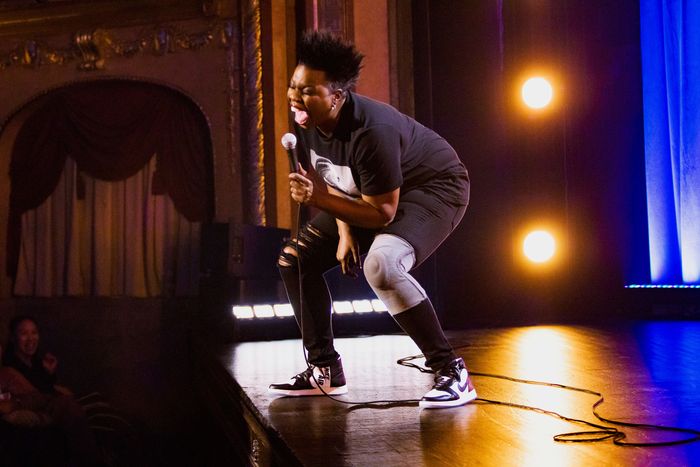
Time Machine is a good title for Leslie Jones’s new Netflix stand-up special. It refers specifically to the final joke of her set, a sequence where she imagines traveling back in time to tell her younger self that she’s going to make it, and then traveling into the future to talk to herself as a 90-year-old.
It’s more than just the final joke, though. It’s also a pervasive theme throughout the hour. The special keeps circling around the idea that Jones is looking back at earlier versions of herself, or is encapsulating something about the experience of being young and aging. It’s a special that works because Jones is so good at measuring the distance between where she was and where she is now. She’s especially good at pointing out the absurdity of both sides, the young and the old, without losing the underlying kernel of understanding.
Jones starts from what feels like overfamiliar territory. The young people today, she tells the audience, are not living up to the standards she wants for them. But it’s not the typical “millennials are entitled” line, and it’s also not the exhausting “kids today are too sensitive.” Jones’s concern is that the 20-year-olds of today are too anxious and too overwhelmed to be doing what 20-year-olds should be doing: partying and working at a Popeyes while they try to figure out their futures.
This on its own might also be a shallow sort of revelation, but this is where Jones’s ability to be a time machine shines. She uses her introduction about the anxious 20-year-olds of today to tell stories about herself as a 20-year-old, especially a story about the time she got tickets to a Grammys after-party and then learned Prince was going to be there. It’s a long and winding account, but the peak of it involves Jones realizing Prince has entered the room and then proceeding to perform a fully choreographed dance to a Prince song in order to catch his attention.
I will not spoil the punch line, which is both simple and hilarious. But the best part of that joke is the dance itself, which Jones performs immaculately and at length, with a facial expression that somehow manages to live in both time periods at once. She is simultaneously a 20-something, extremely serious about getting Prince to sleep with her, and a 50-something comedian, amused by how ridiculous she was. (And lest you discount the importance of how well Jones maintains this expression, she makes a crack elsewhere in the set that knowing how to control her face is a skill she only gained with age.) Her sympathies are with both sides, and when she stops to put her hands on her knees in exhaustion after a long sequence of the dance, she manages to keep hold of both characters at once. She is the 20-year-old, dancing in shoes that do not fit, in front of a superstar she wants to sleep with. She is a 50-year-old wearing a knee brace, performing the dance of her 20-year-old self. Jones herself is the time machine, and her time-traveling abilities are funny and convincing.
Not all of the hour is quite as ecstatically effective as that dance story, or the closing sequence where she imagines what it’d be like if she did actually appear in a time machine in front of her younger self. There’s nothing wrong with vaginal humor, just as there’s nothing wrong with a parade of male comedians making dick jokes, and when Jones connects her pussy-centric material to the larger theme, it works well. It works even though it’s pretty goofy to watch Jones narrate her older vagina as a fire-breathing organ by having it yell “Dracarys!”, especially once you remember that this special is directed by Game of Thrones co-creators D.B. Weiss and David Benioff. But there’s been a run of stand-up that makes a point of explaining that giving birth is hard, and Jones’s twist on the material doesn’t do much to distinguish itself from Michelle Wolf, Ali Wong, or Amy Schumer also explaining that yes, birth is hard. Her material is more insightful and more effective when she finds a tighter, more specific angle.
Beyond the unexpected element in making Weiss and Benioff directors of a comedy special, Time Machine is mostly a well-shot, well-edited work, although its choices are fairly conventional. There is one bit of live performance that makes its way into the final special in an endearing and slightly messy way, though, and I’m not referring to the moment when Jones briefly climbs off the stage to lecture a man about how hard it is to take a dick and how much he should appreciate his wife. That sort of thing, while effective, is also the kind of obviously rehearsed audience bit that aims to seem risky and never comes across as convincing.
No, the bit of accidental spontaneity that does muscle its way into this otherwise highly polished hour is that halfway through, one of Jones’s fake eyelashes begins to slip, and rather than ignore it or try to make it work, she decides to rip her falsies off. There’s a close-up shot of them lying on the stage, resting beautifully in the golden lighting. Like most specials, Time Machine is the composite of at least two filmed performances, so the rest of the hour features cuts back and forth between Jones with and Jones without her large, noticeable false eyelashes. I could make a crack about the attention to detail of the Game of Thrones directors here, but in truth, I’m a fan of the eyelash continuity problem.
As much as anything else in Time Machine, the missing eyelashes communicate how big and ebullient Jones’s performance is. She has the ability to make a careful performance feel wildly combustible. It’s nice to see a special reflect some of the inevitable imperfection of a truly live show.


